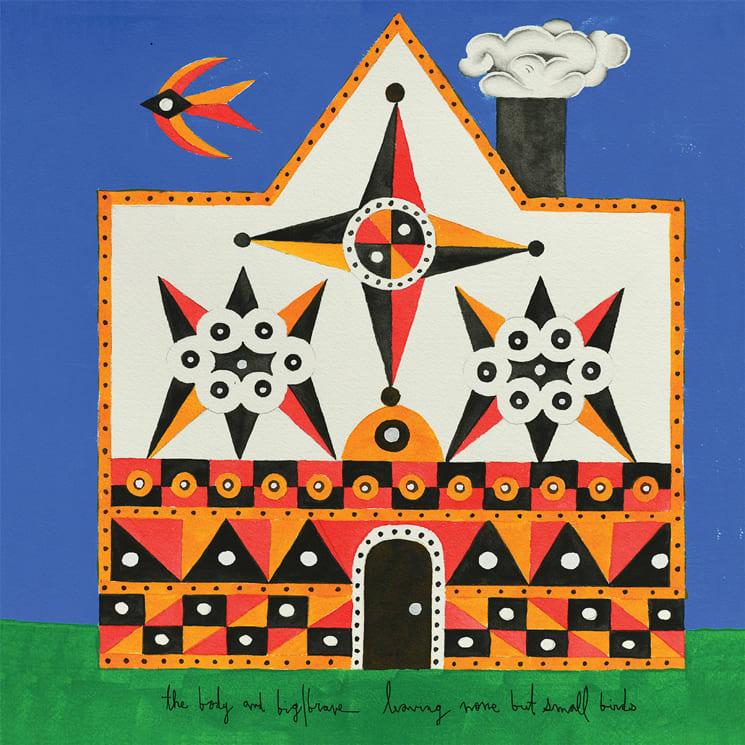On Leaving None but Small Birds, the Body and Big Brave — two of the most consistent and prolific acts in heavy music — have come together to create something completely unique to each other's catalogue. Both artists, known for creating walls of punishing sound and emotional contrast through distortion, have taken a stab at creating folk music.
Through lush instrumental arrangements and haunting vocals, these two artists have created a beautiful album through means previously foreign to them. While somewhat inconsistent, Leaving None but Small Birds is an attempt at daring creativity and emotional honesty that few heavy bands could conjure up.
The album opens with "Blackest Crow" and "Oh Sinner," a pair of highlights that feature complex melodic arrangements and restrained percussion. Instead of walls of distortion, the listener is met with twangy guitars similar to those that soundtrack a Spaghetti Western. The typically bombastic-sounding drums are replaced with a range of much more subdued percussive instruments. For example, "Oh Sinner" fills out Robin Wattie's haunting croons of vengeance with piano and string arrangements, and moments like this on the record show how impressive it is that these bands can reach the same emotional depth of previous records through opposite means.
Not all risks pay off on Leaving None but Small Birds, but the ones that do lead to spectacular results. A song like "Hard Times" unfortunately comes off a bit convoluted and redundant, and yet a song like "Black is a Colour," further stripped down, may ultimately be the most rewarding song on the record. The lack of instrumentation really allows for Wattie's voice to shine, baring all of its emotional honesty. Fans of each band's brand of layered drone finally get a glimpse of it on "Polly Gosford" through a smattering of guitars, strings, and percussive instruments. Even the strained and non-sensical guitar leads throughout the song add to the emotional strain of the piece.
A kind of collaborative effort sorely needed in heavy music, Leaving None but Small Birds is a departure for both bands that results in a mostly positive and rewarding listening experience. This complete change in sonic construction not only introduces these bands to wider audiences, but also gives a glimpse of their greater musical potential moving forward.
(Thrill Jockey)Through lush instrumental arrangements and haunting vocals, these two artists have created a beautiful album through means previously foreign to them. While somewhat inconsistent, Leaving None but Small Birds is an attempt at daring creativity and emotional honesty that few heavy bands could conjure up.
The album opens with "Blackest Crow" and "Oh Sinner," a pair of highlights that feature complex melodic arrangements and restrained percussion. Instead of walls of distortion, the listener is met with twangy guitars similar to those that soundtrack a Spaghetti Western. The typically bombastic-sounding drums are replaced with a range of much more subdued percussive instruments. For example, "Oh Sinner" fills out Robin Wattie's haunting croons of vengeance with piano and string arrangements, and moments like this on the record show how impressive it is that these bands can reach the same emotional depth of previous records through opposite means.
Not all risks pay off on Leaving None but Small Birds, but the ones that do lead to spectacular results. A song like "Hard Times" unfortunately comes off a bit convoluted and redundant, and yet a song like "Black is a Colour," further stripped down, may ultimately be the most rewarding song on the record. The lack of instrumentation really allows for Wattie's voice to shine, baring all of its emotional honesty. Fans of each band's brand of layered drone finally get a glimpse of it on "Polly Gosford" through a smattering of guitars, strings, and percussive instruments. Even the strained and non-sensical guitar leads throughout the song add to the emotional strain of the piece.
A kind of collaborative effort sorely needed in heavy music, Leaving None but Small Birds is a departure for both bands that results in a mostly positive and rewarding listening experience. This complete change in sonic construction not only introduces these bands to wider audiences, but also gives a glimpse of their greater musical potential moving forward.
